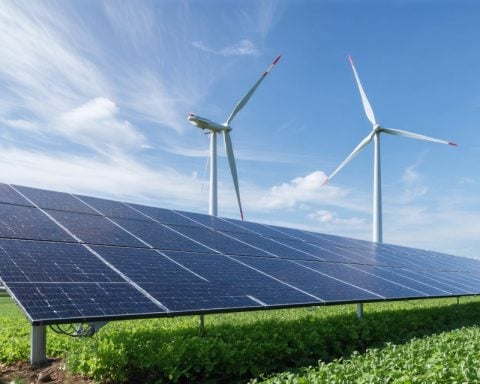Revolutionizing Clean Transport Across America
The Federal Highway Administration recently unveiled a groundbreaking initiative, allocating $635 million to enhance electric vehicle (EV) charging infrastructure and support clean transportation in 27 states, four tribal regions, and Washington D.C. This investment marks a significant step towards a greener future.
The funding distribution includes over $368 million dedicated to expanding community charging projects, while about $268 million will be invested in fast-charging stations along designated corridors. Such efforts will ensure more robust access to EV charging across various regions.
A notable recipient is the Cherokee Nation in Northeast Oklahoma, which is set to receive $10.7 million to deploy EV charging ports at 12 community sites. Additionally, the City of Troy, Alabama, will secure more than $700,000 for charging installations at five strategic locations, including a hospital and a university.
The corridor projects will see substantial developments as well; the Port Authority of Houston will be allocated nearly $25 million for a hydrogen fueling station. Moreover, a partnership among Maryland, Pennsylvania, New Jersey, and West Virginia will utilize $18.6 million to enhance alternative fueling infrastructure along the I-81 and I-78 corridors.
Through this initiative, the government aims to install over 11,500 new EV and alternative fuel ports, fostering equitable transportation options, generating new employment opportunities, and paving the way for innovation across the nation. With EV sales surging, this funding heralds a new era in clean transportation.
Revolutionizing Clean Transport Across America
The recent initiative by the Federal Highway Administration to invest $635 million in electric vehicle (EV) charging infrastructure signals a transformative shift towards sustainable transportation in the United States. This funding project’s implications extend far beyond providing convenience for EV users; it touches upon environmental sustainability, economic growth, and social equity, ultimately shaping the future of humanity.
As global concern for climate change intensifies, the shift towards electric vehicles can significantly reduce greenhouse gas emissions associated with traditional gasoline-powered vehicles. According to the Environmental Protection Agency, transportation is a leading contributor to air pollution and climate change. By investing in EV infrastructure, such as the installation of over 11,500 new EV and alternative fuel ports, the initiative aims to facilitate a transition to cleaner transport. This can result in cleaner air, reduced health risks associated with air pollution, and a substantial decrease in our carbon footprint, fostering a sustainable environment for future generations.
Furthermore, economic implications are noteworthy. The funding allocated for charging stations creates new job opportunities in the growing green economy. As states develop their charging infrastructure, the demand for skilled workers in installation, maintenance, and technology support will rise. The initiative also includes investment in community charging projects, which can stimulate local economies by attracting EV users and promoting local businesses. For example, the funding for the Cherokee Nation and other communities empowers them to harness this movement towards clean transport, creating pathways for economic resilience.
In collaboration with neighboring states, as seen in the effort along the I-81 and I-78 corridors, such partnerships signify a shift towards interconnectedness and cooperative governance in addressing climate issues. This collaboration can serve as a model for other regions to follow, fostering a national network of sustainable transport that aligns with broader environmental and economic strategies.
Importantly, the push for equitable transportation options underscores a desire for inclusivity. By ensuring access to charging infrastructure in underserved communities and tribal regions, the initiative addresses historical inequities in transportation access. This equitable approach can lead to enhanced mobility for all, empowering individuals from diverse backgrounds to partake in the evolving automotive landscape.
Looking ahead, the continued growth of EV sales and investments in charging infrastructure signal a promising trajectory towards a sustainable future. However, our success hinges on policy consistency, technological innovation, and community engagement. The momentum generated by this initiative can catalyze further advancements in clean transportation technologies and infrastructure, which could one day allow humanity to thrive in harmony with our planet.
As we revolutionize clean transport across America, we must remain vigilant about its implications and strive towards a holistic solution that benefits our environment, economy, and society as a whole. The choices made today will undoubtedly shape the world for generations to come.
Driving the Future: $635 Million Boost for Electric Vehicle Infrastructure in America
Revolutionizing Clean Transport Across America
In an unprecedented move aimed at dramatically improving electric vehicle (EV) charging infrastructure across the United States, the Federal Highway Administration has announced a historic investment of $635 million. This funding initiative targets clean transportation in 27 states, four tribal regions, and Washington D.C., marking a significant leap toward a sustainable future.
Key Features of the Initiative
– Funding Allocation: The initiative designates over $368 million specifically for community charging projects. An additional $268 million will focus on developing fast-charging stations along designated travel corridors, ensuring that EV users have access to reliable and efficient charging options no matter where they travel.
– Community Impact: Notable beneficiaries include the Cherokee Nation, which will receive $10.7 million to install EV charging ports at 12 sites, enhancing accessibility for residents and travelers alike. Similarly, the City of Troy, Alabama, will receive over $700,000 to set up EV charging at five strategic locations, including critical institutions like hospitals and universities.
Pros and Cons of the Initiative
Pros:
– Enhanced Charging Access: Increased availability of charging stations will make EV ownership more viable for the average driver.
– Job Creation: The development of this infrastructure is expected to generate numerous job opportunities in installation, maintenance, and engineering sectors.
– Environmental Benefits: Improved access to EV charging supports the transition to cleaner energy solutions, thus helping reduce carbon footprints.
Cons:
– Implementation Challenges: Rapid deployment may face local regulatory hurdles and supply chain delays.
– Funding Sufficiency: While substantial, questions remain whether the funding will cover all necessary infrastructure to meet anticipated demand as EV adoption rates soar.
Market Trends and Predictions
As EV sales continue to surge, the adoption of sustainable transport will likely accelerate. Industry analysts predict that the combination of strong federal funding, state-level initiatives, and increasing consumer awareness about environmental issues will drive the market for electric vehicles and charging infrastructure.
Moreover, innovations in battery technology and renewable energy sources are expected to make EVs even more accessible and appealing to a broader audience. For instance, the upcoming rollout of advanced EV charging networks will include features such as real-time availability updates and dynamic pricing, improving user experience and charging efficiency.
Security and Sustainability Aspects
As this new infrastructure is developed, attention to security is crucial. Ensuring the integrity and safety of charging stations against cyber threats is a top priority. Moreover, projects funded under this initiative are expected to align with sustainability goals by using eco-friendly materials and practices during construction.
Conclusion
This latest funding initiative marks a pivotal moment for America’s shift toward clean transportation. By facilitating the integration of EV charging stations across key locations and partnering with local communities, the government is setting the stage for a more sustainable and equitable future in transportation. Stay updated on developments in this evolving landscape by visiting Energy.gov for more insights on clean energy initiatives.












